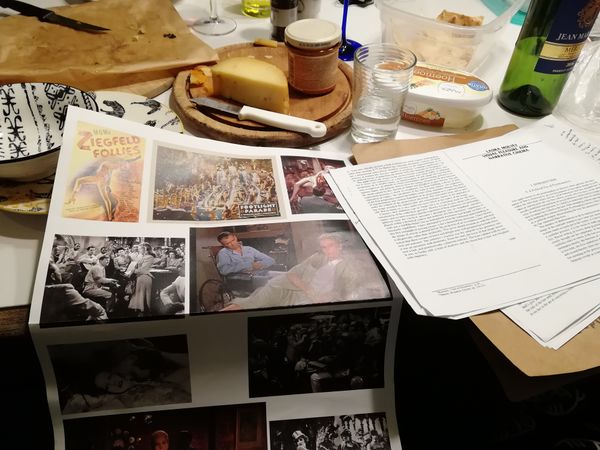Research-group-sjm
FROM LAURA: AFFECT, GAZE, GENDER IN RELATION TO LENS-BASED ART
Members: Susanna, Jue, Marieke
This is how we do it.
core text
Laura Mulvey
- Essay: Visual Pleasure and Narrative Cinema’ (1975, p177 The Narrative Reader) -
- Essay: Afterthoughts on “Visual Pleasure and Narrative Cinema” Inspired by Duel in the Sun (1989, p181, The Narrative Reader)
Find the two essays in this book --> File:The Narrative Reader - Martin McQuillan.pdf
synopsis
specific research questions
Jue
- physical space: What are spaces for illusions? what are the psychological processes of collective viewing? What is the difference between cinema and gallery?
- cinematography: how do focus, camera movement, editing affect the spectator's identification process (whom are they identifying with)? What do close-ups do?
- film theory: how do interacting layers of narrative and icon change the spectator's distance with the subject on screen?
Susanna
- How does the female spectator identify? How do female filmmakers come around male-centered conventions?
- The 3 female gazes
branching text
- The new brutality film: race and affect in contemporary Hollywood cinema - Paul Gormley
- Book: Death 24x Times per second (2005). pdf [1]
- Why be nonbinary - Robin Dembroff [2]
- Why I am not a feminist - Jessa Crispin
- Feeling, Emotions, Affect - Eric Shouse [3]
- Mind the Screen (selected chapters) [4]
- File:The Narrative Reader - Martin McQuillan.pdf
On the origin of Stories - Brian Boydmaybe later- Stories [5]
- The Emergence of Cinematic Time - Mary Ann Doane
- Stillness in the Moving Image: Visualizing Time and Its Passing - Laura Mulvey (2003)
- Invention of Hysteria - Georges Didi-Huberman
- Fire and Ice - Peter Wollen (1984)
- Photography and Fetish - Christian Metz (1985)
for potential movie night! Add a one-line reason for why should watch the film on the film.
- Afternoon Delight - Jill Soloway
- The Florida Project
- Guusje America - Video Home System
- White Noise - Antoine d'Agata
- Marnie - Hitchcock
- Vertigo - Hitchcock
- Lost Highway - Lynch
- Belle de Jour
- Beach Rats - Eliza Hittman
- Alma Har'el - Bombay Beach
Discussions
Next: Movie night 23.03
Screening: Vertigo+Lost Highway
20.03
By the end of the day we would like to have done:
- organize branching text according to our specific research questions (see 17.03)
- outline relevance to listed text/films
17.03
We met to discuss the two essays. We started with Mulvey's conscious use of psychoanalysis as a framework and expressed our frustration towards the outdated vocabulary in Freud's theories. Susanna provided visual references (posters and still shots) to all the movies mentioned in Visual Pleasure.
Threads mentioned in the discussion:
- the three looks, i.e. gazes, in the cinema: the camera, the spectator, and from one character to another
- female poses (e.g. Rear Window)
- Hitchcock's storytelling and cinematography
- meme as an analogy of "stillness" (or fetishizing process) with new technologies
- the lack of perspective/analysis of the female spectator
- humanism as the new feminism
We were reminded of our own upbringings and how that contributed to how we viewed and experienced gender.
We then formulated the questions we want to further research. (via an interview-style conversation).
In terms of writing.
Specific research questions: Laura Mulvey as a point of departure
Jue
- physical space: What are spaces for illusions? what are the psychological processes of collective viewing? What is the difference between cinema and gallery?
- cinematography: how do focus, camera movement, editing affect the spectator's identification process (whom are they identifying with)? What do close-ups do?
- film theory: how do interacting layers of narrative and icon change the spectator's distance with the subject on screen?
Susanna
- How does the female spectator identify? How do female filmmakers come around male-centered conventions?
- The 3 female gazes
Marieke
- How can you create a narrative/discourse? Why do some become more accepted as truth?
Proposed content of the reader
We envision a reader consisting of:
- a selection of essays from the titles we will be reading
- one article (academic and/or creative) written by each of us
- transcript of one interview-style discussion
Next actions
Organize the "branching text" above to reflect our specific research questions.
Movie night #1 is happening on Saturday 23/03.
06.03 (day of forming research group)
Questions from our practice
- How has the spectator/observer/viewer/audience changed over time?
- How do we feel/relate to people when we present an idea/image as a certain gaze (doesn't have to be defined according to gender)?
- What is gaze?
- Should I/we, as female artists be aware of our gaze and our gender when creating culture?
The male gaze is slowly becoming an outdated term.
Let's define gaze intuitively: We look at something for some time, we are intrigued, and we try to understand from our own (cultural) framework of reference.
- Why do filmmakers want to show work? What is inside the filmmaker?
- What's in our work?
Marieke:::subvert norms: make a statement to make the audience (for the lack of the word) aware - how do people relate?
Jue:::meditation: affect - how are people moved in cinema?

